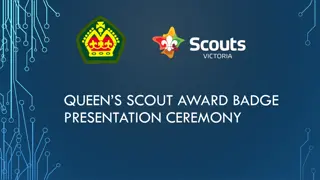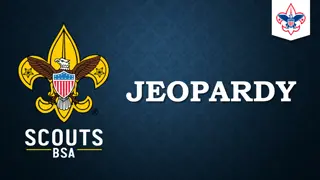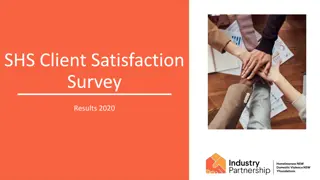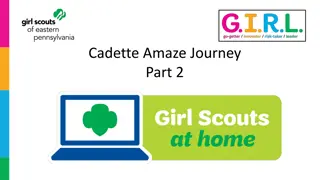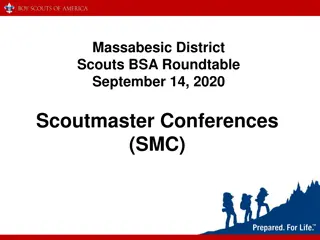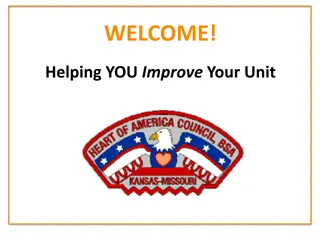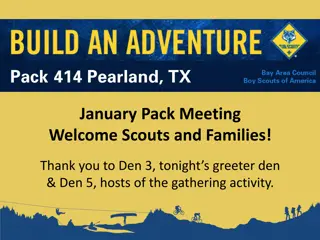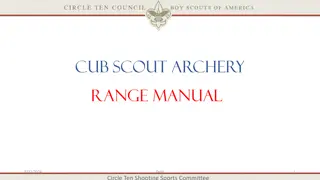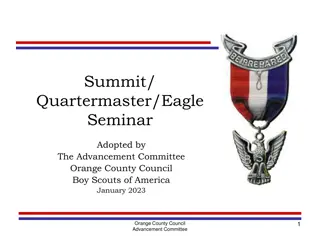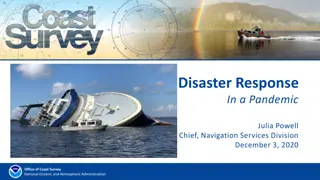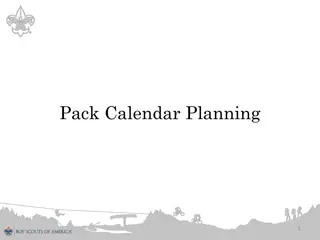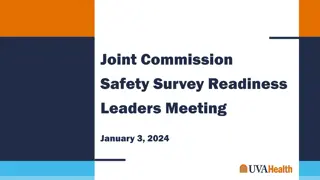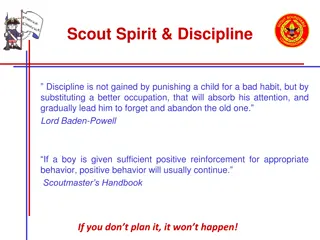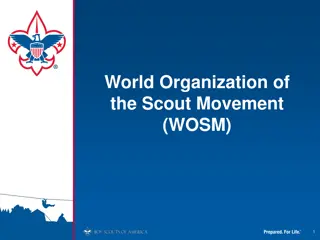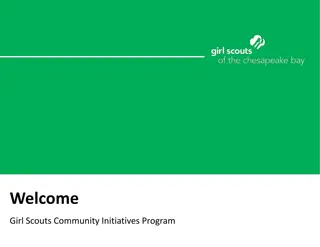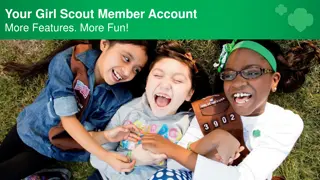Insights from the 2020 Scout Experience Survey
The 2020 Scout Experience Survey revealed key findings on volunteer satisfaction, enjoyment, training resources, and communication quality. Data was collected online, with 9,064 adult volunteers participating. The survey highlighted both positive aspects and areas for improvement in volunteering with Scouts.
Download Presentation

Please find below an Image/Link to download the presentation.
The content on the website is provided AS IS for your information and personal use only. It may not be sold, licensed, or shared on other websites without obtaining consent from the author.If you encounter any issues during the download, it is possible that the publisher has removed the file from their server.
You are allowed to download the files provided on this website for personal or commercial use, subject to the condition that they are used lawfully. All files are the property of their respective owners.
The content on the website is provided AS IS for your information and personal use only. It may not be sold, licensed, or shared on other websites without obtaining consent from the author.
E N D
Presentation Transcript
The 2020 Scout Experience Survey what you had to say
Welcome In March 2020 we ran our third Scout Experience Survey. The survey welcomes all our adult members to share their thoughts. It helps us understand a little more about your experience of volunteering in Scouts The survey results inform our programmes of work and improve the support we provide to members.
Key findings Overall satisfaction with volunteering remains good, though there has been a 7 point decrease in the Net Promoter Score since 2018 Enjoyment from volunteering is a key theme affecting both volunteers intending to continue and (the lack of enjoyment) deciding to stop Improvements have been seen in the indicators around training and resources being available to help volunteers Volunteers remain hugely committed to Scouts, volunteering for longer periods and more frequently than the wider volunteering population Volunteers remain dissatisfied with resources provided by HQ as well as the online tools (the Scouts website, the programme planning tool and Compass), although the Net Promoter Score for HQ resources has improved by 12 points since 2018 There have been steady improvements on all of the indicators of communications quality and frequency since 2018
Methodology Data was collected through an online survey. The survey was launched on 27thFebruary 2020 The survey was closed on 1stJune 2020. Most respondents (91%) replied before face to face Scouting was suspended on 17thMarch 2020 All analyses checked whether there was any impact on the responses given before and after face to face Scouting was suspended Postcodes helped show us if respondents lived in rural or urban areas, and where they ranked on the Index of Multiple Deprivation (IMD). Duplicate responses and disqualified respondents those with no connection to Scouts were removed. Change compared with the 2018 and 2019 surveys This time we did not invite young people and their parents/carers to take part in the survey. We were planning to do some in-depth qualitative research with young people instead but the pandemic altered our plans.
Who took part? After we took out the duplicates, disqualified responses or those who did not say we were left with responses from 9,064 adult volunteers 5,060 section leaders* 2,231 other volunteer roles** 891 Group Scout Leaders * Includes Beaver / Cub / Scout / Explorer section leaders, assistant section leaders or section assistants ** Includes the following roles: occasional helper, executive committee members, district/county/area/regional commissioners, district/county/area/regional roles, country or UK roles Please note that a further 874 adult volunteers responded but did not tell us what role they performed
Do more. Share more. Be more. Adult volunteer participation 12,795 11,882 In 2020 the survey was launched just before the pandemic caused face to face Scouts to be suspended. 9,064 There were a lot of messages going out to volunteers at that time from headquarters. Reminders to ask members to take part in the survey were much reduced compared with previous years. 2018 2019 2020
Our adult volunteers who responded 53% male and 46% female, 1% preferred not to say 96% white, 2% black, Asian, mixed, or other ethnic groups, 3% preferred not to say 86% white, 14% black, Asian, mixed, or other ethnic groups (England & Wales population) 61% Christian, 32% no religion, 2% Buddhist, Hindu, Jewish, Muslim, Sikh, or other religions, 4% preferred not to say 59% Christian, 25% no religion, 8% Buddhist, Hindu, Jewish, Muslim, Sikh, or other religions (England & Wales population) 24% had disabilities or health problems, 72% had no disabilities or health problems, 4% preferred not to say UK disability prevalence is 22% 88% heterosexual or straight, 5% were LGBT+, 7% preferred not to say 93% heterosexual or straight, 2% LGBT+, 5% prefer not to say (UK population) 86% had never been entitled to free school meals, 9% had, 5% preferred not to say
Youth shaped: % of section leaders who agree that young people use their skills to help run Scouts activities and influence decisions locally 61% 55% 52% 50% 49% 48% Young people use their skills to help run Scouts activities for other young people The opinions of young people influence decisions in Scouts locally 2018 2019 2020 RQ#2 & RQ#3 Source: Scout Experience Surveys 2018-20. Sample sizes c. 5,800 in 2018, 5,542 in 2019 and 4,480 in 2020
The extent to which section leaders agree that young people learn by doing, make choices and take responsibility and take part in new activities 97% 97% 96% 75% 75% 72% 13% 12% 11% Young people have taken part in activities through Scouts that they had never tried before When taking part in a Scouts activity, young people make choices about what they do and take responsibility for how it goes Young people learn in Scouts by being told what to do rather than trying things for themselves 2018 2019 2020 Source: Scout Experience Surveys 2018-2020. Sample sizes 5,792 in 2018, 5,592 in 2019 and 4,482 in 2020
Average number of times a year young people take part in these activities 14.9 14.8 13.9 10.6 No data in 2018 No data in 2019 9.3 9.0 9.0 8.2 8.0 7.7 6.9 6.9 5.4 5.1 4.9 3.7 3.5 3.4 3.4 3.4 3.3 3.2 3.2 3.2 3.1 Learning skills that will be useful in their school, work or social life (e.g. cooking, first aid, IT, DIY etc) Learning skills to spend time in the outdoors (such as navigation, camping, survival skills, pioneering etc) Physical, adventurous or sporting activities (e.g climbing, hiking, swimming, cycling etc) Learning about their community (e.g people, places, services and democracy) Volunteering to help other people or the environment Learning about other countries and cultures Creative activities (e.g art, drama, crafts, digital design, music etc) Learning about the faith, beliefs or attitudes of others, or their own Taking part in activities which have an impact in the community 2018 2019 2020 RQ#5 Source: Scout Experience Surveys 2018-2020. Sample sizes 5,796 in 2018, 5,572 in 2019 and 4,501 in 2020
Section leaders estimate of how much it costs a young person to take part in Scouting 260 250 245 2018 2019 2020 Source: Scout Experience Surveys 2018-2020. Sample sizes 5,772 in 2018, 5,529 in 2019 and 4,436 in 2020
What our adult volunteers feel 95% 94% 93% 73% 72% 71% 71% 71% 71% I feel empowered to undertake my role in Scouts I feel valued in my role in Scouts I feel proud to be part of Scouts 2018 2019 2020 RQ#6 Source: Scout Experience Surveys 2018 to 2029. Sample size in 2018 = 9,461, in 2019 = 9,192 and in 2020 = 7,009
Would volunteers recommend volunteering in Scouts to a friend? (Net Promoter Score) 70 50 39.5 37.6 32.7 2018 2019 2020 NPS Excellent World class RQ#20 Source: Scout Experience Surveys 2018 and 2019. Sample sizes in 2018 = 9,601, in 2019 = 9,375 and in 2020 = 7,102
Would volunteers recommend volunteering in Scouts to a friend? : How the Net Promoter Score is made up 13% 16% 17% 34% 31% 34% Detractors (scores 0-6) Passive (scores 7-8) Promoters (scores 9-10) 53% 53% 50% 2018 2019 2020 RQ#20 Source: Scout Experience Surveys 2018 and 2019. Sample sizes in 2018 = 9,601, in 2019 = 9,375 and in 2020 = 7,102
How likely are adult volunteers to recommend being a volunteer in Scouts to a friend? (Net Promoter Score by region / country) 42 40 39 39 38 38 38 38 38 37 36 35 35 35 34 34 33 33 32 31 31 28 28 27 Wales East of England West Midlands East Midlands South East North East Northern Ireland Scotland South West North West Greater London Overall NPS 2020 Excellent World class NPS 2019 RQ#20 Source: Scout Experience Surveys 2019 and 2020. Sample size = 9,375 in 2019 and 7,102 in 2020
How adult volunteers rate their line manager 45% 45% 10% They have opportunities to reflect on their role with their line manager 63% 18% 19% Their line manager keeps them up-to-date 66% 17% 17% They feel supported by line manager 70% 13% 17% They are in regular contact with their line manager Strongly agree or agree Neither agree nor disagree Strongly disagree or disagree RQ#70 Source: Scout Experience Survey 2020 Sample size is around 7, 050 depending on the question
The extent to which adult volunteers feel appreciated 2% 5% 6% 7% 6% 4% 12% 18% 29% 38% 41% 43% Not relevant Not appreciated enough Sometimes appreciated Very much appreciated 63% 50% 41% 34% Appreciation by young people Appreciation by parents Appreciation by other volunteers Appreciation by the Scout Association RQ#80 Source: Scout Experience Survey 2020 Sample size is around 7, 095 depending on the question
Reasons volunteers give for being very likely to continue volunteering over the next 12 months 69% I enjoy it 59% It makes me feel I'm making a difference 34% It gives me a sense of personal achievement 31% If I stop, there's a chance it'll impact whether young people keep taking part 17% It gives me new skills and experiences 15% It improves my mental health and wellbeing 12% It broadens my experience of life 9% I meet new people 9% It brings me into contact with people from different backgrounds and 6% It gives me more confidence 4% It helps me feel less isolated 3% It improves my physical health 1% It improves my employment prospects 7% Other (please specify) Source: Scout Experience Survey 2020 Sample size 5,770
How much money do adult volunteers think they spent to undertake their role with Scouts over the past 12 months*? 158 155 2019 2020 *Participants were asked to only count expenses which were not reimbursed Source: Scout Experience Surveys 2019 & 2020. Sample sizes 5,534 in 2019 and 4,300 in 2020
How adult volunteers found the opportunity to join Scouts 40% 39% 33% 32% 14% 13% 7% 7% 6% 5% 1% 1% 0% 0% 0% 1% 0% 0% My child takes/took part in Scouts I took part in Scouts as a young person I was asked directly by another volunteer in Scouts Other Recommended by a friend or family member Marketing such as posters or adverts in my local area Media such as newspapers, television or radio The Scouts Third party volunteering website such as do- it.org website(scouts.org.uk) 2019 2020 Source: Scout Experience Survey 2019 and 2020. Sample size = 10,675 in 2019 and 8,140 in 2020
How adult volunteers got in touch to volunteer 57% 36% 34% 17% 16% 14% 3% 6% 6% 0% 5% 4% 1% 1% 0% 0% Approached my local Scout Group I was asked to volunteer by my local Scout Group Continued with the Scout Group I attended as a young person Contacted an advertised contact detail for an existing volunteer in Scouts Other Used the Scouts website (scouts.org.uk) Used a third party volunteering website such as do- it.org Contacted the Scouts Information Centre 2019 2020 Note the new category added in the 2020 survey due to feedback in 2019 I was asked to volunteer by my local Scout group Source: Scout Experience Survey 2019 and 2020. Sample size in 2019 = 2,011 and in 2020 = 2,020
Motivations for starting to volunteer with Scouts 35% I wanted to improve things/help people 49% 34% Someone asked me to give help 30% 28% I thought it would give me a chance to use my existing skills 38% 25% The cause was really important to me 29% 24% I had spare time to do it 25% 24% My friends/family were already involved 29% 22% I felt there was a need in my community 25% 20% I thought it would give me a chance to learn new skills 29% 18% It was connected with the needs of my family/friends 18% 15% I felt there was no one else available to help 17% 14% I wanted to meet people/make friends 20% 13% Other (please specify) 7% 7% It's part of my religious belief/philosophy of life to help people 7% 6% It gave me a chance to get some training 0% 5% I thought it would help me get on in my career/to get a recognised 7% 2% Not applicable - there were no reasons in particular why I started 1% 1% Don't know/can't recall 1% 1% None of these 1% 2020 2019 Source: Scout Experience Survey 2019 & 2020. Sample size in 2019 = 10,673 and in 2020 = 8,134
Experience of adult volunteers when they first started volunteering 88% 88% 88% 69% 69% 68% 44% 41% 41% I felt welcome I was supported to fully understand my role and responsibilities There were high quality resources available to help me deliver my role and responsibilities 2018 2019 2020 RQ#11 Source: Scout Experience Surveys 2018 to 2020. Sample size in 2018 = 9,682, in 2019 = 9,398 and in 2020 = 7,145
Views of those who joined Scouts as a volunteer in the past three years (2017 to 2019) I was properly introduced and well supported during my first year of volunteering for Scouts 69% 15% 17% Strongly agree or agree Neither agree nor disagree Strongly disagree or disagree RQ#76 Source: Scout Experience Survey 2020. Sample size = 1,924
Our adult volunteers have been volunteering on average for 9 years 59% took part in Scouts as a young person They volunteer for 15 hours a month (almost twice as much as the wider volunteering population*) 86% of them volunteer at least once a week (double the amount of the wider volunteering population) and of those who could have done, 58% completed the Young Leaders scheme while taking part in Scouts as a young person * NCVO Time Well Spent 2019 Source: Scout Experience Survey 2020. Sample size = 7,979
Adult volunteers experience of training when they first became a volunteer 67% 61% 60% 54% 54% 52% 50% 49% 49% 48% 39% Training was easy to access Training was easy to undertake Training was relevant Training was enjoyable Training happened around the right time it was needed 2018 2019 2020 Source: Scout Experience Surveys 2018 to 2020. Sample size in 2018 = 9,613, in 2019 = 9,385 and in 2020 = 7,149 RQ#12
Adult volunteers experience of training undertaken in the last 12 months 82% 79% 79% 79% 78% 77% 73% 73% 70% 60% 53% Training was easy to access Training was simple to undertake Training was relevant Training was enjoyable Training happened around the right time it was needed 2018 2019 2020 RQ#12a Source: Scout Experience Surveys 2018 to 2020. Sample size in 2018 = 6,496, in 2019 = 6,997 and in 2020 = 5,146
Net Promoter Score: Section leaders who would recommend resources provided by HQ to another volunteer 2018 2019 2020 -34 -40 -46 RQ#9 Source: Scout Experience Surveys 2018 to 2020. Sample size in 2018 = 5,182, in 2019 = 4,957 and in 2020 = 4,012
Net Promoter Score: Section leaders who would recommend resources provided by HQ to another volunteer East of England Greater London East West Midlands Northern Ireland South East North West Midlands South West Scotland North East Wales Overall -18 -29 -30 -30 -32 -34 -36 -37 -37 -39 -39 -39 RQ#9 Source: Scout Experience Survey 2020. Sample size = 4,012
Use of online tools 4% 19% 21% 14% 21% 32% At least once a week 40% Less than once a week, but at least once a month Less often than once a month 40% Never 50% 34% 20% 6% The Scouts website (scouts.org.uk) The programme planning tool Membership system (Compass) Source: Scout Experience Survey 2020. Sample sizes 6,934 (the Scouts website), 6,894 (the programme planning tool), 6,920 (the membership system, Compass)
Net Promoter Score: Adult volunteers who would recommend Scouts online tools to another volunteer The Scouts website (scouts.org.uk) The programme planning tool Membership system (Compass) -20.3 -37.9 -49.2 Source: Scout Experience Survey 2020. Sample sizes 6,493 (the Scouts website), 3,361 (the programme planning tool), 5,469 (the membership system, Compass)
HQ communications read very or fairly often by volunteers 82% 80% 73% No data in 2018 64% 63% 60% 59% 59% 57% 50% 49% 7% 6% 6% Regular emails (eg monthly membership email) Emails on a specific issue (eg from the Chief Commissioner) Scouting magazine Social media Webinar/conference call 2018 2019 2020 Source: Scout Experience Surveys 2018 to 2020. Sample size in 2018 = 9,396, in 2019 = 9,212 and in 2020 = 7,045
How volunteers feel about communications from HQ (% agreement with these statements) 63% 57% 54% 53% 50% 50% 48% 48% 47% 42% 42% 39% 39% 39% 34% Communications from UK Headquarters are quick to read Communications from UK Headquarters are clear on any actions I need to take The information I receive is necessary for my role I feel informed by UK Headquarters about national changes to Scouts that affect me Communications from UK Headquarters are easy to understand 2018 2019 2020 Source: Scout Experience Surveys 2018 to 2020. Sample size in 2018 = 9,397, in 2019 = 9,209 and in 2020 = 7,037
Of the volunteers who had stopped volunteering in the past 12 months, these are the reasons they gave for leaving 30% I had less time because my circumstances changed (home, work, 29% I was unhappy with the way my volunteering was managed or 25% I didn't enjoy or stopped enjoying the experience 18% I was unhappy with the way I was treated by other volunteers 16% I wanted to have more time to do other things (hobbies, family, other 16% I was unhappy with the way other volunteers behaved 16% It caused me too much stress 10% I felt I had done my bit (e.g. it's someone else's turn to get involved) 7% My children left Scouts or moved on to another section 6% Due to health reasons 5% Due to age reasons 3% It was too expensive 3% The Group or section closed or meeting time changed 2% I didn't get on with the other volunteers 2% Scouts isn't relevant to me anymore 1% My family/partner didn't want me to be involved any more 19% Other (please specify) Source: Scout Experience Survey 2020. Sample size = 110
Of the volunteers who say they are highly likely to stop volunteering in the coming 12 months, these are the reasons they give 38% I'm unhappy with the way my volunteering is managed or organised 34% It's causing me too much stress 33% I haven't enjoyed or I've stopped enjoying the experience 20% I'm unhappy with the way I'm being treated by other volunteers 19% I feel I have done my bit (e.g. it's someone else's turn to get involved) 18% I am going to have less time because my circumstances are changing 17% I'm unhappy with the way other volunteers behave 11% I want to have more time to do other things (hobbies, family, other 5% My children are leaving Scouts or moving on to another section 3% Scouts isn't relevant to me anymore 2% Due to age reasons 2% My family/partner didn't want me to be involved any more 1% Due to health reasons 1% The Group or section is closing or the meeting time is changing 1% I don't get on with the other volunteers 1% It's too expensive 22% Other (please specify) Source: Scout Experience Survey 2020. Sample size = 207
Number of committee meetings 82% of Executive Committees meet at least once a quarter and another 10% meet at least once a month. 91% of Executive Committee members said they understand their role and legal responsibilities as a trustee of a charity and 88% are able to constructively challenge opinions that they do not agree with. Only 70% agree that they have had suitable training to perform their role. Source: Scout Experience Survey 2020. Sample size = 674
Executive Committee members perception of where responsibility lies 68% 30% The management of any property owned/rented by the charity 62% 36% Financial health of the charity 35% 62% Fundraising 3% Engaging with local influencers and decision makers (such as local media, local authority or politicians) 26% 69% 4% 6% 91% Health and Safety 4% 90% 6% Equality, diversity and inclusion 4% 89% 7% Safeguarding 3% 82% 15% Recruiting new young people and adult volunteers 3% 9% 89% Planning and delivery of the weekly programme, events and nights away 49% 50% The overall quality of the Scout Programme delivered to young people % Executive Committee % Joint responsibility % Commissioner, Group Scout Leader or Section Leaders Source: Scout Experience Survey 2020. Sample size = 673
How Executive Committees are run 89% 6% 5% Financial decisions and performance are closely monitored Members of the Executive Committee have the appropriate skills and knowledge to be effective charity trustees 77% 17% 7% 75% 18% 7% Disagreements are dealt with in a timely and effective manner Members of the Executive Committee reflect the diversity of the local community they represent (ie in terms of ethnicity, wealth, disability, gender, sexuality, religion or belief) 46% 35% 19% What young people think directly influences the decisions the Executive Committee makes 39% 42% 19% We spend lots of time talking about whether we're achieving the aims of Scouts effectively and sustainably 34% 39% 27% We spend more time talking about the day-to-day management of Groups than strategic, longer-term issues 29% 39% 32% % agree % neither agree or disagree % disagree Source: Scout Experience Survey 2020. Sample size = 672
Sources of support used by Executive Committee members 74% Another member of the Executive Committee 50% The Scouts Headquarters 21% Other please describe: 12% The charity regulator for my part of the UK 2% I wouldn t know where to seek support Source: Scout Experience Survey 2020. Sample size = 673
Places Scouting is delivered Places Scouts is delivered in were recorded as - 54% owned property - 20% rented properties - 27% using a property owned by someone else free of charge or for minimal payment 32% of places were reported as high quality, 47% satisfactory and 21% low quality Source: Scout Experience Survey 2020 Sample size = 138 ( Executive Committee chairpersons only)
Fundraising activities in the previous 12 months 73% 64% 63% 55% 54% 52% 41% 37% 25% Individual giving (Bag packing, raffles, events etc) Grant applications (Funding from local authorities, Government, Trusts and Foundations etc) Corporate partnerships (Sponsorship or gifts from a local business) 2018 2019 2020 Source: Scout Experience Surveys 2018-2020. Sample sizes = 193 in 2018, 219 in 2019 and 153 in 2020. Executive Committee treasurers only
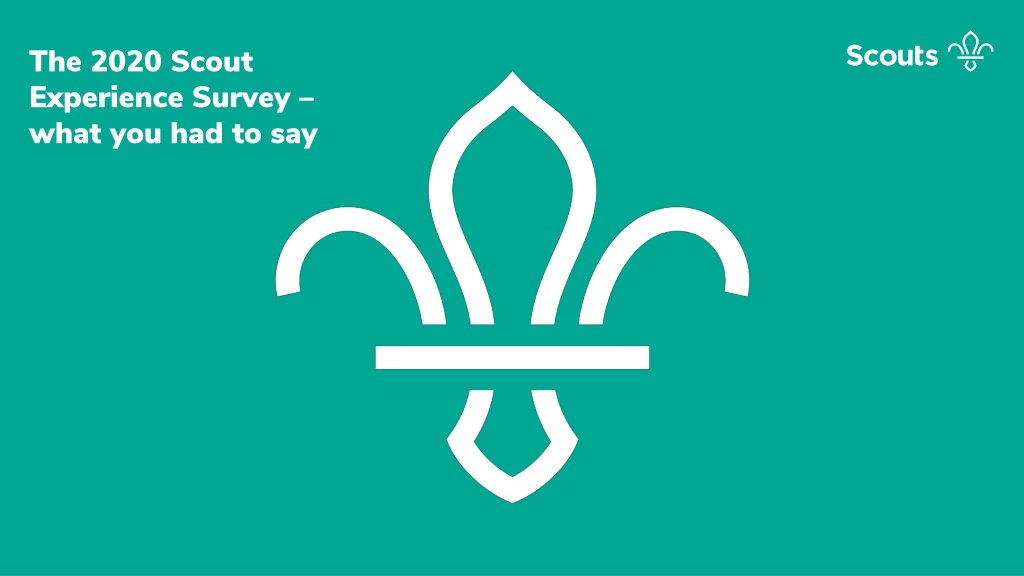
 undefined
undefined




